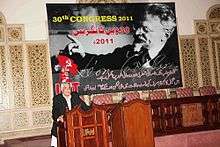Lal Khan
| Lal Khan | |
|---|---|
 Lal Khan addressing 30th Congress of The Struggle | |
| Born |
1956 Bhaun, Punjab, Pakistan |
| Nationality | Pakistani |
| Alma mater |
Nishtar Medical College Vrije Universiteit Amsterdam |
| Occupation | Political theorist, activist, writer |
| Website | http://www.struggle.pk/ |
Lal Khan is a political activist and Marxist political theorist.
He was a physician by profession but no longer practices medicine. He is the leader of the Pakistani Marxist organisation The Struggle, and editor of its newspaper.[1] He also writes regular articles for Daily Times and the Dunya.
Early life
In the 1970s, Khan was a student of medicine in college and a political activist in Pakistan when the military coup of General Zia ul Haq toppled the Pakistan Peoples Party government, and subsequently hanged the country's first democratically elected prime minister Zulfiqar Ali Bhutto.[2] He was imprisoned for a year, then went to university in the capital of Pakistan, Islamabad.[3] He moved to The Netherlands in 1980 to escape the sentenced to death him in Pakistan.[4] During his time in exile, he graduated from the Vrije Universiteit in Amsterdam, and continued to reside in the Netherlands for eight more years. In the 1988, he returned to his country and quit his profession as a doctor, and has been working full-time in revolutionary politics ever since.
Career
He is the leading member of The Struggle which is based on the ideas of Marx, Engels, Lenin and Trotsky and advocates a socialist transformation of Pakistan. It demands the nationalization of the commanding heights of the economy under workers control, an end to religious extremism and radicalism, the eradication of unemployment and free accessible education for all Pakistani citizens.[2] He is the Editor of Asian Marxist Review and International Secretary of Pakistan Trade Union Defence Campaign.
On 12–13 March 2011 the largest congress of The Struggle was held in Lahore. These annual congresses are held to analyse the performance of The Struggle and to formulate new strategies for social change and revolution.[5][6]
In October 2013, Khan accused Malala Yousafzai's supporters in the West of appropriating her and concealing her socialist background.[7]
In a joint statement in August 2016, Khan and CPI(M) Jammu and Kashmir general secretary Mohammed Yousuf Tarigami called for revolutionary unity between the working classes of India and Pakistan to resolve the Kashmir conflict and overthrow capitalism in the subcontinent.[8]
Publications
- Partition – Can it be undone? This book examines the historical background of partition of the Indian subcontinent, and the formation of Pakistan and India.[9]
- Lebanon-Israel War. Written in 2009, this book discusses not only the current conflict between Lebanon and Israel in detail, but also looks at the history of wars and revolutions in the whole region. The changing role of Iran in the region and the possibility of an invasion of Iran are also discussed in detail.
- Pakistan's Other Story – The Revolution of 1968–69. This book examines the student and political activism of the late 1960s which gave birth to a revolution. Khan argues that due to lack of leadership courage, the opportunity to establish a worker's state was lost.[10][11]
- Kashmir, A revolutionary way out. This book examines the possibility of the liberation of Kashmir under a united South Asian socialist federation.[12]
See also
References
- ↑ Sampath Perera (30 June 2012). "New Pakistani prime minister appointed". World Socialist Web Site. International Committee of the Fourth International (ICFI). Retrieved 24 July 2012.
- 1 2 "Interview with Lal Khan from Pakistan". Newyouth.com. 8 June 1999. Retrieved 19 March 2012.
- ↑ "Lal Khan". Meri Jedojehad (in Urdu). Karachi. 7 November 2010. AAJ TV.
- ↑ Sher Khan; Hashim Bin Rashid (21 October 2007). "Blacked out". The Express Tribune. Retrieved 11 August 2012.
- ↑ "The Struggle congress 2009 – Pakistan Marxists on the move!". In Defence of Marxism. 27 March 2009. Retrieved 12 March 2011.
- ↑ Anonymous. "Historic 32nd congress of Pakistani section of IMT – First Day". In Defense of Marxism. Retrieved 21 October 2013.
- ↑ Lal Khan. "Malala's ordeal". Daily Times. Retrieved 21 October 2013.
- ↑ Mohammed Yousuf Tarigami; Lal Khan (30 August 2016). "Kashmir: Repression, Obstacles and Resilience of the Mass Struggle". Asian Marxist Review. Retrieved 1 September 2016.
- ↑ R. L. Singal (12 August 2007). "View from the left". The Tribune. Retrieved 29 July 2012.
- ↑ Mamoon Chaudhry (18 August 2012). "Review: Pakistan's Other Story: The Revolution of 1968–1969 by Lal Khan". Dawn. Retrieved 18 August 2012.
- ↑ Mahtab Bashir (30 December 2008). "Dr Lal Khan's book launched". Daily Times (Pakistan). Retrieved 24 July 2012.
- ↑ ""Kashmir, A revolutionary way out" by Lal Khan". The Struggle (in Urdu). 18 April 2012. Retrieved 11 August 2012.
External links
| Wikimedia Commons has media related to Lal Khan. |
- Official website of The Struggle
- Website of Pakistan Trade Union Defence Campaign
- Lal Khan in the Daily Times